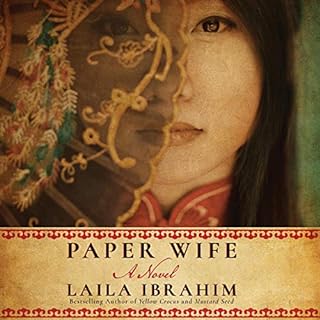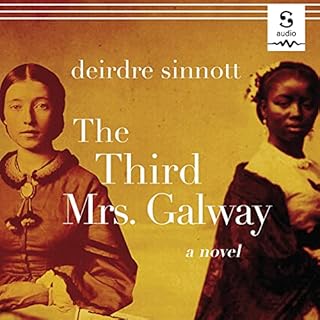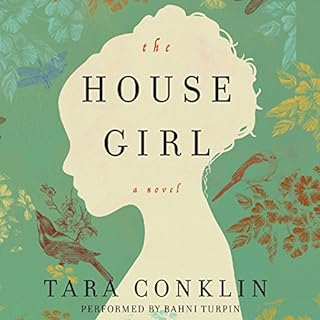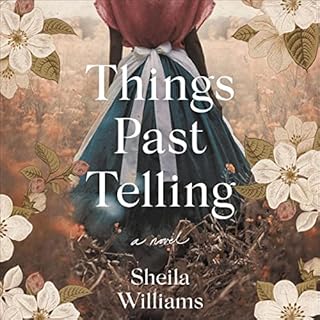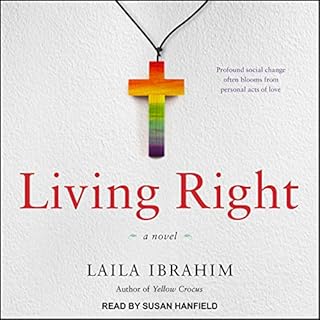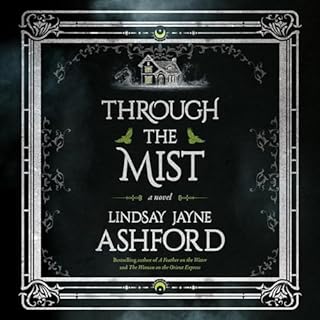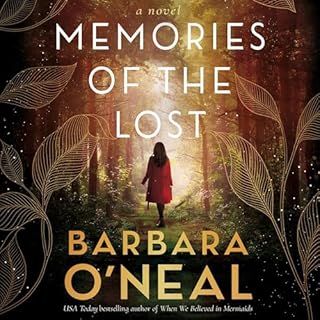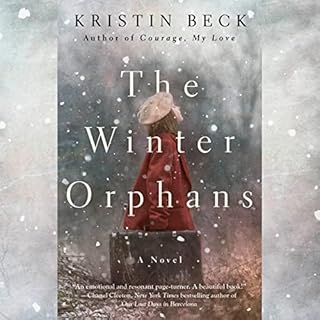-
Falling Wisteria
- A Novel (Yellow Crocus, Book 5)
- Narrado por: Bahni Turpin
- Duración: 10 h y 6 m
No se pudo agregar al carrito
Add to Cart failed.
Error al Agregar a Lista de Deseos.
Error al eliminar de la lista de deseos.
Error al añadir a tu biblioteca
Error al seguir el podcast
Error al dejar de seguir el podcast
 Exclusivo para miembros Prime: ¿Nuevo en Audible? Obtén 2 audiolibros gratis con tu prueba.
Exclusivo para miembros Prime: ¿Nuevo en Audible? Obtén 2 audiolibros gratis con tu prueba.Compra ahora por $30.09
No default payment method selected.
We are sorry. We are not allowed to sell this product with the selected payment method
Resumen del Editor
As America enters WWII, two women on the home front strive to stay strong in a heartfelt novel about hope, friendship, and family by the bestselling author of Yellow Crocus and Golden Poppies.
Kay Lynn Brooke is a wife and mother in Berkeley, California, building a solid future with her husband and family. Then on December 7, 1941, the bombing of Pearl Harbor throws Kay Lynn’s life, and the lives of everyone she knows and loves, into chaos.
Within weeks, Kay Lynn’s dearest friend, Kimiko, is forcibly relocated with her family to an internment camp. Kay Lynn’s brother, fortified with a youthful and patriotic spirit, ships out for the Pacific. Her husband enlists ahead of the draft and leaves home for basic training, while Kay Lynn’s sister works for the war effort on the home front—and holds a secret that places her in a different kind of danger.
As Kay Lynn struggles to parent, keep the household together, and challenge the social mores of the time, she both finds and gives strength through her letters to Kimiko. Over the next few uncertain years, and longing for the safe and simple clarity of the past, Kay Lynn has no choice but to find her own place and purpose in a rapidly changing world.
Los oyentes también disfrutaron...
-
Yellow Crocus
- Yellow Crocus, Book 1
- De: Laila Ibrahim
- Narrado por: Bahni Turpin
- Duración: 8 h y 21 m
- Versión completa
-
General4.5 out of 5 stars 12,527
-
Narración:5 out of 5 stars 11,170
-
Historia4.5 out of 5 stars 11,131
Moments after Lisbeth is born, she’s taken from her mother and handed over to an enslaved wet nurse, Mattie, a young mother separated from her own infant son in order to care for her tiny charge. Thus begins an intense relationship that will shape both of their lives for decades to come. Though Lisbeth leads a life of privilege, she finds nothing but loneliness in the company of her overwhelmed mother and her distant, slave-owning father.
-
5 out of 5 stars
-
A rare find, a 5 star book!
- De Kathy in CA en 02-22-15
De: Laila Ibrahim
-
Paper Wife
- A Novel
- De: Laila Ibrahim
- Narrado por: Nancy Wu
- Duración: 9 h y 47 m
- Versión completa
-
General4.5 out of 5 stars 3,662
-
Narración:4.5 out of 5 stars 3,131
-
Historia4.5 out of 5 stars 3,120
Southern China, 1923. Desperate to secure her future, Mei Ling’s parents arrange a marriage to a widower in California. To enter the country, she must pretend to be her husband’s first wife - a paper wife. On the perilous voyage, Mei Ling takes an orphan girl named Siew under her wing. Dreams of a better life in America give Mei Ling the strength to endure the treacherous journey and detainment on Angel Island. But when she finally reaches San Francisco, she’s met with a surprise. Her husband, Chinn Kai Li, is a houseboy, not the successful merchant he led her to believe.
-
3 out of 5 stars
-
Just okay..disappointed
- De Donna Smith McG en 11-03-18
De: Laila Ibrahim
-
Sister of Mine
- A Novel
- De: Sabra Waldfogel
- Narrado por: Bahni Turpin
- Duración: 17 h y 22 m
- Versión completa
-
General4.5 out of 5 stars 3,205
-
Narración:5 out of 5 stars 2,905
-
Historia4.5 out of 5 stars 2,886
When two Union soldiers stumble onto a plantation in northern Georgia on a warm May day in 1864, the last thing they expect is to see the Union flag flying high - or to be greeted by a group of freed slaves and their Jewish mistress. Little do they know that this place has an unusual history. Twelve years prior, Adelaide Mannheim - daughter of Mordecai, the only Jewish planter in the county - was given her own maid, a young slave named Rachel. The two became friends, and soon they discovered a secret.
-
4 out of 5 stars
-
A Must Read
- De M. Ryder en 06-20-16
De: Sabra Waldfogel
-
The Third Mrs. Galway
- De: Deirdre Sinnott
- Narrado por: Rebecca Lee
- Duración: 11 h y 4 m
- Versión completa
-
General4.5 out of 5 stars 75
-
Narración:4.5 out of 5 stars 72
-
Historia4.5 out of 5 stars 72
It’s 1835 in Utica, New York, and newlywed Helen Galway discovers a secret: Two runaway slaves are hiding in the shack behind her husband’s house. Suddenly, she is at the center of not only the era’s greatest moral dilemma, but her own, as well. Should she be a “good wife” and report the fugitives to her husband? Or will she defy convention and come to their aid? Within her home, Helen is haunted by the previous Mrs. Galway, recently deceased but still an oppressive presence.
-
5 out of 5 stars
-
Never thought I'd enjoy a novel so much.
- De HBvideo en 12-01-21
De: Deirdre Sinnott
-
The Dust Bowl Orphans
- De: Suzette D. Harrison
- Narrado por: Jordan Frazier, Rachel Handshaw
- Duración: 10 h y 58 m
- Versión completa
-
General4.5 out of 5 stars 105
-
Narración:4.5 out of 5 stars 87
-
Historia5 out of 5 stars 86
Fifteen-year-old Faith Wilson takes her little sister Hope’s hand. In worn-down shoes, they walk through the choking heat of the Dust Bowl, toward a new life in California. But when a storm blows in, the girls are separated from their parents. Starving and forced to sleep on the streets, Faith thinks a room in a small boarding house will keep her sister safe. But the glare in the landlady’s eye, as Faith leaves in search of their parents, has her wondering if she’s made a dangerous mistake.
-
1 out of 5 stars
-
It MIGHT be good , I will never know
- De R York en 08-26-22
-
The House Girl
- A Novel
- De: Tara Conklin
- Narrado por: Bahni Turpin
- Duración: 14 h y 42 m
- Versión completa
-
General4.5 out of 5 stars 1,254
-
Narración:4.5 out of 5 stars 1,101
-
Historia4 out of 5 stars 1,106
The year is 2004: Lina Sparrow is an ambitious young lawyer working on a historic class-action lawsuit seeking reparations for the descendants of American slaves. The year is 1852: Josephine is a 17-year-old house slave who tends to the mistress of a Virginia tobacco farm - an aspiring artist named Lu Anne Bell. It is through her father, renowned artist Oscar Sparrow, that Lina discovers a controversy rocking the art world: Art historians now suspect that the revered paintings of Lu Anne Bell, an antebellum artist known for her humanizing portraits of the slaves who worked her Virginia tobacco farm, were actually the work of her house slave, Josephine.
-
3 out of 5 stars
-
Disappointing
- De Jeanette Finan en 02-21-13
De: Tara Conklin
-
Yellow Crocus
- Yellow Crocus, Book 1
- De: Laila Ibrahim
- Narrado por: Bahni Turpin
- Duración: 8 h y 21 m
- Versión completa
-
General4.5 out of 5 stars 12,527
-
Narración:5 out of 5 stars 11,170
-
Historia4.5 out of 5 stars 11,131
Moments after Lisbeth is born, she’s taken from her mother and handed over to an enslaved wet nurse, Mattie, a young mother separated from her own infant son in order to care for her tiny charge. Thus begins an intense relationship that will shape both of their lives for decades to come. Though Lisbeth leads a life of privilege, she finds nothing but loneliness in the company of her overwhelmed mother and her distant, slave-owning father.
-
5 out of 5 stars
-
A rare find, a 5 star book!
- De Kathy in CA en 02-22-15
De: Laila Ibrahim
-
Paper Wife
- A Novel
- De: Laila Ibrahim
- Narrado por: Nancy Wu
- Duración: 9 h y 47 m
- Versión completa
-
General4.5 out of 5 stars 3,662
-
Narración:4.5 out of 5 stars 3,131
-
Historia4.5 out of 5 stars 3,120
Southern China, 1923. Desperate to secure her future, Mei Ling’s parents arrange a marriage to a widower in California. To enter the country, she must pretend to be her husband’s first wife - a paper wife. On the perilous voyage, Mei Ling takes an orphan girl named Siew under her wing. Dreams of a better life in America give Mei Ling the strength to endure the treacherous journey and detainment on Angel Island. But when she finally reaches San Francisco, she’s met with a surprise. Her husband, Chinn Kai Li, is a houseboy, not the successful merchant he led her to believe.
-
3 out of 5 stars
-
Just okay..disappointed
- De Donna Smith McG en 11-03-18
De: Laila Ibrahim
-
Sister of Mine
- A Novel
- De: Sabra Waldfogel
- Narrado por: Bahni Turpin
- Duración: 17 h y 22 m
- Versión completa
-
General4.5 out of 5 stars 3,205
-
Narración:5 out of 5 stars 2,905
-
Historia4.5 out of 5 stars 2,886
When two Union soldiers stumble onto a plantation in northern Georgia on a warm May day in 1864, the last thing they expect is to see the Union flag flying high - or to be greeted by a group of freed slaves and their Jewish mistress. Little do they know that this place has an unusual history. Twelve years prior, Adelaide Mannheim - daughter of Mordecai, the only Jewish planter in the county - was given her own maid, a young slave named Rachel. The two became friends, and soon they discovered a secret.
-
4 out of 5 stars
-
A Must Read
- De M. Ryder en 06-20-16
De: Sabra Waldfogel
-
The Third Mrs. Galway
- De: Deirdre Sinnott
- Narrado por: Rebecca Lee
- Duración: 11 h y 4 m
- Versión completa
-
General4.5 out of 5 stars 75
-
Narración:4.5 out of 5 stars 72
-
Historia4.5 out of 5 stars 72
It’s 1835 in Utica, New York, and newlywed Helen Galway discovers a secret: Two runaway slaves are hiding in the shack behind her husband’s house. Suddenly, she is at the center of not only the era’s greatest moral dilemma, but her own, as well. Should she be a “good wife” and report the fugitives to her husband? Or will she defy convention and come to their aid? Within her home, Helen is haunted by the previous Mrs. Galway, recently deceased but still an oppressive presence.
-
5 out of 5 stars
-
Never thought I'd enjoy a novel so much.
- De HBvideo en 12-01-21
De: Deirdre Sinnott
-
The Dust Bowl Orphans
- De: Suzette D. Harrison
- Narrado por: Jordan Frazier, Rachel Handshaw
- Duración: 10 h y 58 m
- Versión completa
-
General4.5 out of 5 stars 105
-
Narración:4.5 out of 5 stars 87
-
Historia5 out of 5 stars 86
Fifteen-year-old Faith Wilson takes her little sister Hope’s hand. In worn-down shoes, they walk through the choking heat of the Dust Bowl, toward a new life in California. But when a storm blows in, the girls are separated from their parents. Starving and forced to sleep on the streets, Faith thinks a room in a small boarding house will keep her sister safe. But the glare in the landlady’s eye, as Faith leaves in search of their parents, has her wondering if she’s made a dangerous mistake.
-
1 out of 5 stars
-
It MIGHT be good , I will never know
- De R York en 08-26-22
-
The House Girl
- A Novel
- De: Tara Conklin
- Narrado por: Bahni Turpin
- Duración: 14 h y 42 m
- Versión completa
-
General4.5 out of 5 stars 1,254
-
Narración:4.5 out of 5 stars 1,101
-
Historia4 out of 5 stars 1,106
The year is 2004: Lina Sparrow is an ambitious young lawyer working on a historic class-action lawsuit seeking reparations for the descendants of American slaves. The year is 1852: Josephine is a 17-year-old house slave who tends to the mistress of a Virginia tobacco farm - an aspiring artist named Lu Anne Bell. It is through her father, renowned artist Oscar Sparrow, that Lina discovers a controversy rocking the art world: Art historians now suspect that the revered paintings of Lu Anne Bell, an antebellum artist known for her humanizing portraits of the slaves who worked her Virginia tobacco farm, were actually the work of her house slave, Josephine.
-
3 out of 5 stars
-
Disappointing
- De Jeanette Finan en 02-21-13
De: Tara Conklin
-
Incidents in the Life of a Slave Girl
- De: Harriet Ann Jacobs
- Narrado por: Mia Ellis
- Duración: 8 h y 14 m
- Versión completa
-
General5 out of 5 stars 477
-
Narración:5 out of 5 stars 417
-
Historia5 out of 5 stars 415
Harriet Ann Jacob's autobiography documents her life as a slave and how she attained freedom for herself and her children. Harrowing in its descriptions of sexual abuse, Jacob's slave narrative is notable for the appeal it made to abolitionist women to open their eyes to the realities of slavery. Deemed too shocking for reading audiences at the time, the book was shelved before it was published in 1861 near the start of the Civil War.
-
1 out of 5 stars
-
Will not finish it....
- De Karen M. Curry en 11-17-20
-
A Woman of Endurance
- A Novel
- De: Dahlma Llanos-Figueroa
- Narrado por: Tracey Leigh
- Duración: 12 h y 39 m
- Versión completa
-
General4.5 out of 5 stars 262
-
Narración:4.5 out of 5 stars 233
-
Historia4.5 out of 5 stars 232
A Woman of Endurance, set in nineteenth-century Puerto Rican plantation society, follows Pola, a deeply spiritual African woman who is captured and later sold for the purpose of breeding future slaves. The resulting babies are taken from her as soon as they are born. Pola loses the faith that has guided her and becomes embittered and defensive. The dehumanizing violence of her life almost destroys her. But this is not a novel of defeat but rather one of survival, regeneration, and reclamation of common humanity.
-
5 out of 5 stars
-
The difference in this book.
- De all our stories en 06-08-22
-
Long Gone, Come Home
- De: Monica Chenault-Kilgore
- Narrado por: Bahni Turpin
- Duración: 11 h y 28 m
- Versión completa
-
General4.5 out of 5 stars 46
-
Narración:5 out of 5 stars 45
-
Historia4.5 out of 5 stars 45
Birdie Jennings dreams of a big life beyond her small town of Mt. Sterling, Kentucky—beyond her mundane job tying tobacco leaves at Wrights Factory, beyond her position as the baby of the family. Her life changes when she meets smooth-talking Jimmy Walker. Jimmy makes big promises for an exciting life together, and Birdie is quickly swept off her feet. But some short years after they marry, Jimmy disappears without a trace, leaving Birdie hurt and alone with their two toddlers. Out of money and out of options, Birdie moves back home with her overbearing mother.
-
5 out of 5 stars
-
family and love
- De joyce en 02-09-24
-
The Thread Collectors
- A Novel
- De: Shaunna J. Edwards, Alyson Richman
- Narrado por: Robin Miles
- Duración: 10 h y 42 m
- Versión completa
-
General4.5 out of 5 stars 235
-
Narración:5 out of 5 stars 217
-
Historia4.5 out of 5 stars 217
1863: In a small Creole cottage in New Orleans, an ingenious young Black woman named Stella embroiders intricate maps on repurposed cloth to help enslaved men flee and join the Union Army. Bound to a man who would kill her if he knew of her clandestine activities, Stella has to hide not only her efforts but her love for William, a Black soldier and a brilliant musician.
-
5 out of 5 stars
-
Extremely good!
- De Doodle slave en 07-02-23
De: Shaunna J. Edwards, y otros
-
Things Past Telling
- A Novel
- De: Sheila Williams
- Narrado por: Robin Miles
- Duración: 11 h y 12 m
- Versión completa
-
General5 out of 5 stars 467
-
Narración:5 out of 5 stars 433
-
Historia5 out of 5 stars 430
Born in West Africa in the mid-eighteenth century, Maryam Prescilla Grace—a.k.a “Momma Grace” will live a long, wondrous life marked by hardship, oppression, opportunity, and love. Though she will be “gifted” various names, her birth name is known to her alone. Over the course of 100-plus years, she survives capture, enslavement by several property owners, the Atlantic crossing when she is only eleven years of age, and a brief stint as a pirate’s ward, acting as both a spy and a translator.
-
5 out of 5 stars
-
Fulfilled
- De Lovin Life en 08-18-22
De: Sheila Williams
-
The Yellow Wife
- A Novel
- De: Sadeqa Johnson
- Narrado por: Robin Miles
- Duración: 9 h y 31 m
- Versión completa
-
General5 out of 5 stars 5,327
-
Narración:5 out of 5 stars 4,751
-
Historia5 out of 5 stars 4,737
Born on a plantation in Charles City, Virginia, Pheby Delores Brown has lived a relatively sheltered life. Shielded by her mother’s position as the estate’s medicine woman and cherished by the Master’s sister, she is set apart from the others on the plantation, belonging to neither world. She’d been promised freedom on her eighteenth birthday, but instead of the idyllic life she imagined with her true love, Essex Henry, Pheby is forced to leave the only home she has ever known. She unexpectedly finds herself thrust into the bowels of slavery at the infamous Devil’s Half Acre.
-
5 out of 5 stars
-
A Real page turner
- De Elizabeth Early en 01-19-21
De: Sadeqa Johnson
-
Crow Mary
- A Novel
- De: Kathleen Grissom
- Narrado por: Carolina Hoyos
- Duración: 11 h y 5 m
- Versión completa
-
General4.5 out of 5 stars 175
-
Narración:4.5 out of 5 stars 154
-
Historia4.5 out of 5 stars 154
In 1872, sixteen-year-old Goes First, a Crow Native woman, marries Abe Farwell, a white fur trader. He gives her the name Mary, and they set off on the long trip to his trading post in the Cypress Hills of Saskatchewan, Canada. Along the way, she finds a fast friend in a Métis named Jeannie; makes a lifelong enemy in a wolfer named Stiller; and despite learning a dark secret of Farwell’s past, falls in love with her husband.
-
5 out of 5 stars
-
One of the best Native American Novels I’ve read.
- De Mizclaire en 07-16-23
De: Kathleen Grissom
-
Mrs. Wiggins
- De: Mary Monroe
- Narrado por: Shari Peele
- Duración: 9 h y 38 m
- Versión completa
-
General4.5 out of 5 stars 3,238
-
Narración:5 out of 5 stars 2,932
-
Historia4.5 out of 5 stars 2,919
The daughter of a prostitute mother and an alcoholic father, Maggie Franklin knew her only way out was to marry someone upstanding and church-going. Someone like Hubert Wiggins, the most eligible man in Lexington, Alabama - and the son of its most revered preacher. Proper and prosperous, Hubert is glad to finally have a wife, even one with Maggie's background. For Hubert has a secret he desperately needs to stay hidden. And Maggie's unexpected charm, elegance, and religious devotion makes her the perfect partner in lies....
-
5 out of 5 stars
-
Really enjoyed
- De avidreader en 04-07-21
De: Mary Monroe
-
The Woman in the White Kimono
- A Novel
- De: Ana Johns
- Narrado por: Emily Woo Zeller, Lauren Ezzo
- Duración: 11 h y 55 m
- Versión completa
-
General4.5 out of 5 stars 321
-
Narración:4 out of 5 stars 288
-
Historia4.5 out of 5 stars 287
Japan, 1957. Seventeen-year-old Naoko Nakamura’s prearranged marriage to the son of her father’s business associate would secure her family’s status in their traditional Japanese community, but Naoko has fallen for another man - an American sailor, a gaijin - and to marry him would bring great shame upon her entire family. When it’s learned Naoko carries the sailor’s child, she’s cast out in disgrace and forced to make unimaginable choices with consequences that will ripple across generations.
-
1 out of 5 stars
-
DO NOT LISTEN! Decent story, HORRIBLE narration!!!
- De David Meier en 05-07-20
De: Ana Johns
-
Always & Forever: A Saga of Slavery and Deliverance
- Plantation Series, Book 1
- De: Gretchen Craig
- Narrado por: Allyson Johnson
- Duración: 11 h y 51 m
- Versión completa
-
General4.5 out of 5 stars 465
-
Narración:4.5 out of 5 stars 413
-
Historia4.5 out of 5 stars 414
Since they were children running barefoot about Toulouse Plantation, Josie and Cleo have been as close as sisters, forging an unbreakable bond that defies their roles as mistress and slave. Together, the two have shared secrets and protected each other through happiness and heartbreak. They never dream they could also share an intense passion for the same man, the elegant, charming, and irresistibly seductive Bertrand Chamard.
-
1 out of 5 stars
-
Nope. Nope. Nope. And nope!
- De Jacqueline Landry en 06-24-20
De: Gretchen Craig
-
Ignite
- De: Joan Vassar
- Narrado por: JD Jackson
- Duración: 9 h y 46 m
- Versión completa
-
General4.5 out of 5 stars 90
-
Narración:5 out of 5 stars 86
-
Historia4.5 out of 5 stars 86
Life in 1925 Atlanta, Georgia, makes Truck realize three things: He must demand respect … Be uncompromising in the protection of his family … And see Josephine for who she really is … When his family is faced with losing everything, Truck embarks on a path from which there is no turning back. Ignite is a complicated tale of passion and unconditional love while navigating the Jim Crow South.
-
5 out of 5 stars
-
Authentic Characters
- De Wdj en 06-12-24
De: Joan Vassar
-
My Name Is Ona Judge
- De: Suzette D. Harrison
- Narrado por: Tovah Ott, Aure Nash
- Duración: 10 h y 16 m
- Versión completa
-
General4.5 out of 5 stars 130
-
Narración:4.5 out of 5 stars 117
-
Historia4.5 out of 5 stars 117
Rain soaks Tessa Scott as she runs from her car to the old vine-covered property she has been called to survey. She’s too busy to accept a new job, but doing this favor for the grandmother of her childhood sweetheart delays a painful decision she must make about her controlling boyfriend. When Tessa finds a tattered journal carefully hidden inside the house’s ancient fireplace, the tragic story of how Ona was ripped from her mother’s arms to live and work in the palatial Mount Vernon, and the heart-shattering betrayal that led her to risk her life and run, has Tessa spellbound.
-
5 out of 5 stars
-
My name is Ona Judge
- De Mz Shantay en 05-28-23
Reseñas de la Crítica
“Bahni Turpin's narration draws listeners into the fifth in Ibrahim's Yellow Crocus series. The audiobook opens with a birth and the bombing of Pearl Harbor. (Turpin gets five stars for realistic childbirth sounds.)… Turpin underplays the occasionally sentimental dialogue and high emotions, keeping the real drama from becoming melodrama. Her sensitive descriptions of returning soldiers, both physically and mentally wounded, are flawless, and her handling of episodes of unbridled xenophobia makes this shameful period in American history all too real. Worthwhile listening thanks to Turpin's assured and compassionate performance.” —AudioFile Magazine
“The impact of internment on the detainees is well narrated, and their friends’ feelings of sadness, loss, and guilt are aptly shown. The falling and reblooming of wisteria flowers are blended nicely into the story. Highly recommended.” —Historical Novels Review
Relacionado con este tema
-
George Orwell’s 1984
- An Audible Original adaptation
- De: George Orwell, Joe White - adaptation
- Narrado por: Andrew Garfield, Cynthia Erivo, Andrew Scott, y otros
- Duración: 3 h y 27 m
- Grabación Original
-
General4.5 out of 5 stars 7,970
-
Narración:5 out of 5 stars 7,587
-
Historia4.5 out of 5 stars 7,586
It’s 1984, and life has changed beyond recognition. Airstrip One, formerly known as Great Britain, is a place where Big Brother is always watching, and nobody can hide. Except, perhaps, for Winston Smith. Whilst working at the Ministry of Truth, rewriting history, he secretly dreams of freedom. And in a world where love and sex are forbidden, where it’s hard to distinguish between friend and foe, he meets Julia and O’Brien and vows to rebel.
-
5 out of 5 stars
-
A Revelation!
- De wotsallthisthen en 04-07-24
De: George Orwell, y otros
-
Dead Med
- De: Freida McFadden
- Narrado por: Patricia Santomasso, Scott Merriman
- Duración: 10 h y 3 m
- Versión completa
-
General4.5 out of 5 stars 730
-
Narración:4.5 out of 5 stars 712
-
Historia4.5 out of 5 stars 712
When Heather McKinley dreamed of becoming a doctor, she imagined curing sick kids and sporting pink stethoscopes. She never anticipated the sleepless nights, grueling exams, and endless labs. And she certainly never knew that her medical school earned the nickname Dead Med thanks to the tragic history of students overdosing on illegal drugs. But Heather would never consider doing anything like that. That is, until her longtime boyfriend dumps her, she finds herself failing anatomy, and her world starts to crumble.
-
3 out of 5 stars
-
Hmm
- De Morgan Meaux en 08-22-24
De: Freida McFadden
-
The Art of War
- De: Sun Tzu
- Narrado por: Aidan Gillen
- Duración: 1 h y 7 m
- Versión completa
-
General4.5 out of 5 stars 41,382
-
Narración:4.5 out of 5 stars 34,264
-
Historia4.5 out of 5 stars 33,845
The 13 chapters of The Art of War, each devoted to one aspect of warfare, were compiled by the high-ranking Chinese military general, strategist, and philosopher Sun-Tzu. In spite of its battlefield specificity, The Art of War has found new life in the modern age, with leaders in fields as wide and far-reaching as world politics, human psychology, and corporate strategy finding valuable insight in its timeworn words.
-
5 out of 5 stars
-
The actual book The Art of War, not a commentary
- De Fred271 en 12-31-19
De: Sun Tzu
-
Holiday Hideaway
- A Short Story
- De: Mary Kay Andrews
- Narrado por: Eva Kaminsky
- Duración: 1 h y 59 m
- Versión completa
-
General4.5 out of 5 stars 173
-
Narración:4.5 out of 5 stars 167
-
Historia4.5 out of 5 stars 167
Tilly Farriday isn’t feeling very jolly this season. Recently divorced and broke, she’s squatting in one of her rental agency’s properties until her new home is ready. The sprinkles on top of the burnt Christmas cookie that is her life? The new owner shows up early, forcing Tilly to hide in the attic to save her job…and what remains of her dignity.
-
4 out of 5 stars
-
I ain’t afraid of no ghosts
- De 🔥 Phx17 🔥 en 10-31-24
De: Mary Kay Andrews
-
Technically Speaking
- De: Michael Elliot
- Narrado por: Coco Jones, Keith Powers, Queen Latifah, y otros
- Duración: 1 h y 50 m
- Grabación Original
-
General4.5 out of 5 stars 1,133
-
Narración:5 out of 5 stars 1,119
-
Historia4.5 out of 5 stars 1,119
Oakland-bred LaVeesha “Vee” Gilliam (Coco Jones) is a determined single mother of an autistic son and a gifted aspiring coder. When Vee loses her job as a food-services worker at the onsite restaurant at Grapengine, a large Silicon Valley tech company, she’s unable to pay for her son’s much-needed specialized education. By a twist of fate, mistaken identity, and her tech skills, Vee meets Troy Wilson (Keith Powers), the company’s wealthy founder and CEO and a wunderkind in the tech industry, who believes that Vee is a college-educated techie who works at his company.
-
5 out of 5 stars
-
Overdue Diverse Representation in Tech!
- De Jatai Pollock en 09-26-24
De: Michael Elliot
-
Fahrenheit 451
- De: Ray Bradbury
- Narrado por: Tim Robbins
- Duración: 5 h y 1 m
- Versión completa
-
General4.5 out of 5 stars 32,550
-
Narración:4.5 out of 5 stars 28,969
-
Historia4.5 out of 5 stars 28,924
Guy Montag is a fireman. In his world, where television rules and literature is on the brink of extinction, firemen start fires rather than put them out. His job is to destroy the most illegal of commodities, the printed book, along with the houses in which they are hidden. Montag never questions the destruction and ruin his actions produce, returning each day to his bland life and wife, Mildred, who spends all day with her television "family."
-
4 out of 5 stars
-
Wish I Hadn't Cliff Noted This in High School
- De Joel en 03-27-17
De: Ray Bradbury
-
George Orwell’s 1984
- An Audible Original adaptation
- De: George Orwell, Joe White - adaptation
- Narrado por: Andrew Garfield, Cynthia Erivo, Andrew Scott, y otros
- Duración: 3 h y 27 m
- Grabación Original
-
General4.5 out of 5 stars 7,970
-
Narración:5 out of 5 stars 7,587
-
Historia4.5 out of 5 stars 7,586
It’s 1984, and life has changed beyond recognition. Airstrip One, formerly known as Great Britain, is a place where Big Brother is always watching, and nobody can hide. Except, perhaps, for Winston Smith. Whilst working at the Ministry of Truth, rewriting history, he secretly dreams of freedom. And in a world where love and sex are forbidden, where it’s hard to distinguish between friend and foe, he meets Julia and O’Brien and vows to rebel.
-
5 out of 5 stars
-
A Revelation!
- De wotsallthisthen en 04-07-24
De: George Orwell, y otros
-
Dead Med
- De: Freida McFadden
- Narrado por: Patricia Santomasso, Scott Merriman
- Duración: 10 h y 3 m
- Versión completa
-
General4.5 out of 5 stars 730
-
Narración:4.5 out of 5 stars 712
-
Historia4.5 out of 5 stars 712
When Heather McKinley dreamed of becoming a doctor, she imagined curing sick kids and sporting pink stethoscopes. She never anticipated the sleepless nights, grueling exams, and endless labs. And she certainly never knew that her medical school earned the nickname Dead Med thanks to the tragic history of students overdosing on illegal drugs. But Heather would never consider doing anything like that. That is, until her longtime boyfriend dumps her, she finds herself failing anatomy, and her world starts to crumble.
-
3 out of 5 stars
-
Hmm
- De Morgan Meaux en 08-22-24
De: Freida McFadden
-
The Art of War
- De: Sun Tzu
- Narrado por: Aidan Gillen
- Duración: 1 h y 7 m
- Versión completa
-
General4.5 out of 5 stars 41,382
-
Narración:4.5 out of 5 stars 34,264
-
Historia4.5 out of 5 stars 33,845
The 13 chapters of The Art of War, each devoted to one aspect of warfare, were compiled by the high-ranking Chinese military general, strategist, and philosopher Sun-Tzu. In spite of its battlefield specificity, The Art of War has found new life in the modern age, with leaders in fields as wide and far-reaching as world politics, human psychology, and corporate strategy finding valuable insight in its timeworn words.
-
5 out of 5 stars
-
The actual book The Art of War, not a commentary
- De Fred271 en 12-31-19
De: Sun Tzu
-
Holiday Hideaway
- A Short Story
- De: Mary Kay Andrews
- Narrado por: Eva Kaminsky
- Duración: 1 h y 59 m
- Versión completa
-
General4.5 out of 5 stars 173
-
Narración:4.5 out of 5 stars 167
-
Historia4.5 out of 5 stars 167
Tilly Farriday isn’t feeling very jolly this season. Recently divorced and broke, she’s squatting in one of her rental agency’s properties until her new home is ready. The sprinkles on top of the burnt Christmas cookie that is her life? The new owner shows up early, forcing Tilly to hide in the attic to save her job…and what remains of her dignity.
-
4 out of 5 stars
-
I ain’t afraid of no ghosts
- De 🔥 Phx17 🔥 en 10-31-24
De: Mary Kay Andrews
-
Technically Speaking
- De: Michael Elliot
- Narrado por: Coco Jones, Keith Powers, Queen Latifah, y otros
- Duración: 1 h y 50 m
- Grabación Original
-
General4.5 out of 5 stars 1,133
-
Narración:5 out of 5 stars 1,119
-
Historia4.5 out of 5 stars 1,119
Oakland-bred LaVeesha “Vee” Gilliam (Coco Jones) is a determined single mother of an autistic son and a gifted aspiring coder. When Vee loses her job as a food-services worker at the onsite restaurant at Grapengine, a large Silicon Valley tech company, she’s unable to pay for her son’s much-needed specialized education. By a twist of fate, mistaken identity, and her tech skills, Vee meets Troy Wilson (Keith Powers), the company’s wealthy founder and CEO and a wunderkind in the tech industry, who believes that Vee is a college-educated techie who works at his company.
-
5 out of 5 stars
-
Overdue Diverse Representation in Tech!
- De Jatai Pollock en 09-26-24
De: Michael Elliot
-
Fahrenheit 451
- De: Ray Bradbury
- Narrado por: Tim Robbins
- Duración: 5 h y 1 m
- Versión completa
-
General4.5 out of 5 stars 32,550
-
Narración:4.5 out of 5 stars 28,969
-
Historia4.5 out of 5 stars 28,924
Guy Montag is a fireman. In his world, where television rules and literature is on the brink of extinction, firemen start fires rather than put them out. His job is to destroy the most illegal of commodities, the printed book, along with the houses in which they are hidden. Montag never questions the destruction and ruin his actions produce, returning each day to his bland life and wife, Mildred, who spends all day with her television "family."
-
4 out of 5 stars
-
Wish I Hadn't Cliff Noted This in High School
- De Joel en 03-27-17
De: Ray Bradbury
-
Brain Damage
- De: Freida McFadden
- Narrado por: Megan Tusing
- Duración: 9 h y 32 m
- Versión completa
-
General4.5 out of 5 stars 1,885
-
Narración:4.5 out of 5 stars 1,771
-
Historia4.5 out of 5 stars 1,771
As Charly struggles to recover from her brain injury, she begins to realize that the events of that fateful night are trapped in the damaged right side of her brain. Now, she must put the jigsaw pieces together to discover the identity of the man who tried to kill her...before he finishes the job he started.
-
5 out of 5 stars
-
Who Else Laughed, Cried, and Shuddered?
- De Jennifer Chichester en 09-16-22
De: Freida McFadden
-
Starship Troopers
- De: Robert A. Heinlein
- Narrado por: R.C. Bray
- Duración: 8 h y 15 m
- Versión completa
-
General4.5 out of 5 stars 835
-
Narración:5 out of 5 stars 796
-
Historia4.5 out of 5 stars 796
Johnnie Rico never really intended to join up—and definitely not the infantry. But now that he’s in the thick of it, trying to get through combat training harder than anything he could have imagined, he knows everyone in his unit is one bad move away from buying the farm in the interstellar war the Terran Federation is waging against the Arachnids. Because everyone in the Mobile Infantry fights. And if the training doesn’t kill you, the Bugs are more than ready to finish the job.
-
5 out of 5 stars
-
The definitive version!
- De Kristopher G. Hesson en 10-03-24
-
Ghost Stories: Stephen Fry's Definitive Collection
- De: Stephen Fry, Washington Irving, M.R. James, y otros
- Narrado por: Stephen Fry
- Duración: 8 h y 18 m
- Versión completa
-
General4.5 out of 5 stars 635
-
Narración:5 out of 5 stars 545
-
Historia4.5 out of 5 stars 545
As the days grow shorter and the temperature drops, Halloween approaches. Come, brave listener, pull up a chair, and spend some time with master storyteller Stephen Fry as he tells us some of his favourite ghost stories of all time, in truly terrifying spatial audio. From the headless horseman of Sleepy Hollow to the tortured spirits of M.R. James, from Edgar Allan Poe’s terrifying tale of a doppelganger to Charlotte Riddell’s Open Door that should definitely stay shut, join Stephen as he tells you some truly terrifying tales.
-
4 out of 5 stars
-
Wonderful narration. Mediocre stories.
- De Michael Fuchs en 11-07-23
De: Stephen Fry, y otros
-
Slayers: A Buffyverse Story
- De: Christopher Golden, Amber Benson
- Narrado por: Amber Benson, Charisma Carpenter, James Charles Leary, y otros
- Duración: 8 h y 2 m
- Grabación Original
-
General4.5 out of 5 stars 2,766
-
Narración:5 out of 5 stars 2,567
-
Historia4.5 out of 5 stars 2,566
Original cast members from the beloved TV series, Buffy the Vampire Slayer, reunite for an all-new adventure about connections that never die—even if you bury them. A decade has passed since the epic final battle that concluded Buffy the Vampire Slayer (TV). The game-changing spell that gave power to all potential Slayers persists. With new Slayers constantly emerging, things are looking grim for the bad guys.
-
5 out of 5 stars
-
A dream come true
- De Anonymous User en 10-12-23
De: Christopher Golden, y otros
-
The Strange Case
- De: Derek Kolstad, Mitali Jahagirdar, Laurie Kirwan-Ashman, y otros
- Narrado por: Vanessa Kirby, David Oyelowo, Sofie Gråbøl, y otros
- Duración: 4 h y 9 m
- Grabación Original
-
General4.5 out of 5 stars 1,353
-
Narración:5 out of 5 stars 1,302
-
Historia4.5 out of 5 stars 1,302
Dr. Jekyll (Vanessa Kirby) is an elite international specialist in energy systems, working closely with her handler Louis (David Oyelowo) in a career that takes her across the globe to politically volatile territories such as Iran and North Korea. But when an arms dealer accuses her of having killed his family, Dr. Jekyll begins to question details of her life, who Louis really is, and whether her strange recurring dream has a greater meaning. She enlists the help of psychologist Sigrun (Sofie Gråbøl), and together they delve into Dr. Jekyll’s darker other side, a brutal assassin named… Hyde.
-
5 out of 5 stars
-
Love the Originals !!
- De r2coder en 08-04-24
De: Derek Kolstad, y otros
-
Wynonna Earp
- Tales from Purgatory
- De: Emily Andras
- Narrado por: Melanie Scrofano, Tim Rozon, Dom Provost-Chalkley, y otros
- Duración: 4 h
- Grabación Original
-
General4.5 out of 5 stars 609
-
Narración:4.5 out of 5 stars 593
-
Historia4.5 out of 5 stars 593
Saddle up and join Wynonna Earp on an immersive new audio adventure in the gritty supernatural world of Purgatory. This Audible Original invites you deeper into the Weird West to follow Wynonna Earp (Melanie Scrofano), as she embarks on her craziest adventure yet: riding off into the sunset with her soulmate, Doc Holliday (Tim Rozon)—yes ... that Doc Holliday. Brace yourself for more wise-cracking demon hunters, earth-shattering revelations and all the genre-blending action you've come to expect from the cult hit TV series.
-
5 out of 5 stars
-
Happy #Earper ☺️
- De Kate Skidmore en 10-17-24
De: Emily Andras
Las personas que vieron esto también vieron...
-
Yellow Crocus
- Yellow Crocus, Book 1
- De: Laila Ibrahim
- Narrado por: Bahni Turpin
- Duración: 8 h y 21 m
- Versión completa
-
General4.5 out of 5 stars 12,527
-
Narración:5 out of 5 stars 11,170
-
Historia4.5 out of 5 stars 11,131
Moments after Lisbeth is born, she’s taken from her mother and handed over to an enslaved wet nurse, Mattie, a young mother separated from her own infant son in order to care for her tiny charge. Thus begins an intense relationship that will shape both of their lives for decades to come. Though Lisbeth leads a life of privilege, she finds nothing but loneliness in the company of her overwhelmed mother and her distant, slave-owning father.
-
5 out of 5 stars
-
A rare find, a 5 star book!
- De Kathy in CA en 02-22-15
De: Laila Ibrahim
-
Paper Wife
- A Novel
- De: Laila Ibrahim
- Narrado por: Nancy Wu
- Duración: 9 h y 47 m
- Versión completa
-
General4.5 out of 5 stars 3,662
-
Narración:4.5 out of 5 stars 3,131
-
Historia4.5 out of 5 stars 3,120
Southern China, 1923. Desperate to secure her future, Mei Ling’s parents arrange a marriage to a widower in California. To enter the country, she must pretend to be her husband’s first wife - a paper wife. On the perilous voyage, Mei Ling takes an orphan girl named Siew under her wing. Dreams of a better life in America give Mei Ling the strength to endure the treacherous journey and detainment on Angel Island. But when she finally reaches San Francisco, she’s met with a surprise. Her husband, Chinn Kai Li, is a houseboy, not the successful merchant he led her to believe.
-
3 out of 5 stars
-
Just okay..disappointed
- De Donna Smith McG en 11-03-18
De: Laila Ibrahim
-
The Other Americans
- A Novel
- De: Laila Lalami
- Narrado por: Mozhan Marnò, P.J. Ochlan, Adenrele Ojo, y otros
- Duración: 10 h y 45 m
- Versión completa
-
General4.5 out of 5 stars 702
-
Narración:4.5 out of 5 stars 616
-
Historia4 out of 5 stars 613
From the Pulitzer Prize finalist and author of The Moor’s Account, here is a timely and powerful novel about the suspicious death of a Moroccan immigrant—at once a family saga, a murder mystery, and a love story, informed by the treacherous fault lines of American culture.
-
1 out of 5 stars
-
Don't bother - there are so many better stories
- De Robin Davis en 10-22-19
De: Laila Lalami
-
Living Right
- De: Laila Ibrahim
- Narrado por: Susan Hanfield
- Duración: 8 h y 13 m
- Versión completa
-
General3.5 out of 5 stars 29
-
Narración:3 out of 5 stars 25
-
Historia3.5 out of 5 stars 25
Jenn Henderson is proud of the church-centered life she's created for her family. She prays each morning, attends worship every Sunday, and confidently takes up the struggle to defend traditional marriage when she learns marriage licenses are being issued to gays and lesbians in nearby San Francisco. But the certainty that she is living right falters after her teenage son, Josh, swallows a bottle of sleeping pills. Her fear deepens when she discovers that Josh struggles with same-sex attraction. If she's living right, how can Josh be gay?
-
1 out of 5 stars
-
Controversial
- De Danielle C Woodruff en 10-22-19
De: Laila Ibrahim
-
The House Girl
- A Novel
- De: Tara Conklin
- Narrado por: Bahni Turpin
- Duración: 14 h y 42 m
- Versión completa
-
General4.5 out of 5 stars 1,254
-
Narración:4.5 out of 5 stars 1,101
-
Historia4 out of 5 stars 1,106
The year is 2004: Lina Sparrow is an ambitious young lawyer working on a historic class-action lawsuit seeking reparations for the descendants of American slaves. The year is 1852: Josephine is a 17-year-old house slave who tends to the mistress of a Virginia tobacco farm - an aspiring artist named Lu Anne Bell. It is through her father, renowned artist Oscar Sparrow, that Lina discovers a controversy rocking the art world: Art historians now suspect that the revered paintings of Lu Anne Bell, an antebellum artist known for her humanizing portraits of the slaves who worked her Virginia tobacco farm, were actually the work of her house slave, Josephine.
-
3 out of 5 stars
-
Disappointing
- De Jeanette Finan en 02-21-13
De: Tara Conklin
-
The Seventh Girl
- Detective Kat Ballantyne, Book 1
- De: Andy Maslen
- Narrado por: Ell Potter
- Duración: 10 h y 48 m
- Versión completa
-
General4 out of 5 stars 154
-
Narración:4.5 out of 5 stars 148
-
Historia4 out of 5 stars 148
Fifteen years ago, a serial killer was on a rampage murdering young women in Middlehampton. Then, suddenly, the killings stopped, and the murderer was never found… So when the body of another young woman is found bearing the twisted killer’s unique hallmark—the overpowering stench of lavender and an origami heart—DS Kat Ballantyne knows this can only mean one thing: the killer is back.
-
5 out of 5 stars
-
Great Start to a New Series
- De EJ en 07-04-24
De: Andy Maslen
-
Yellow Crocus
- Yellow Crocus, Book 1
- De: Laila Ibrahim
- Narrado por: Bahni Turpin
- Duración: 8 h y 21 m
- Versión completa
-
General4.5 out of 5 stars 12,527
-
Narración:5 out of 5 stars 11,170
-
Historia4.5 out of 5 stars 11,131
Moments after Lisbeth is born, she’s taken from her mother and handed over to an enslaved wet nurse, Mattie, a young mother separated from her own infant son in order to care for her tiny charge. Thus begins an intense relationship that will shape both of their lives for decades to come. Though Lisbeth leads a life of privilege, she finds nothing but loneliness in the company of her overwhelmed mother and her distant, slave-owning father.
-
5 out of 5 stars
-
A rare find, a 5 star book!
- De Kathy in CA en 02-22-15
De: Laila Ibrahim
-
Paper Wife
- A Novel
- De: Laila Ibrahim
- Narrado por: Nancy Wu
- Duración: 9 h y 47 m
- Versión completa
-
General4.5 out of 5 stars 3,662
-
Narración:4.5 out of 5 stars 3,131
-
Historia4.5 out of 5 stars 3,120
Southern China, 1923. Desperate to secure her future, Mei Ling’s parents arrange a marriage to a widower in California. To enter the country, she must pretend to be her husband’s first wife - a paper wife. On the perilous voyage, Mei Ling takes an orphan girl named Siew under her wing. Dreams of a better life in America give Mei Ling the strength to endure the treacherous journey and detainment on Angel Island. But when she finally reaches San Francisco, she’s met with a surprise. Her husband, Chinn Kai Li, is a houseboy, not the successful merchant he led her to believe.
-
3 out of 5 stars
-
Just okay..disappointed
- De Donna Smith McG en 11-03-18
De: Laila Ibrahim
-
The Other Americans
- A Novel
- De: Laila Lalami
- Narrado por: Mozhan Marnò, P.J. Ochlan, Adenrele Ojo, y otros
- Duración: 10 h y 45 m
- Versión completa
-
General4.5 out of 5 stars 702
-
Narración:4.5 out of 5 stars 616
-
Historia4 out of 5 stars 613
From the Pulitzer Prize finalist and author of The Moor’s Account, here is a timely and powerful novel about the suspicious death of a Moroccan immigrant—at once a family saga, a murder mystery, and a love story, informed by the treacherous fault lines of American culture.
-
1 out of 5 stars
-
Don't bother - there are so many better stories
- De Robin Davis en 10-22-19
De: Laila Lalami
-
Living Right
- De: Laila Ibrahim
- Narrado por: Susan Hanfield
- Duración: 8 h y 13 m
- Versión completa
-
General3.5 out of 5 stars 29
-
Narración:3 out of 5 stars 25
-
Historia3.5 out of 5 stars 25
Jenn Henderson is proud of the church-centered life she's created for her family. She prays each morning, attends worship every Sunday, and confidently takes up the struggle to defend traditional marriage when she learns marriage licenses are being issued to gays and lesbians in nearby San Francisco. But the certainty that she is living right falters after her teenage son, Josh, swallows a bottle of sleeping pills. Her fear deepens when she discovers that Josh struggles with same-sex attraction. If she's living right, how can Josh be gay?
-
1 out of 5 stars
-
Controversial
- De Danielle C Woodruff en 10-22-19
De: Laila Ibrahim
-
The House Girl
- A Novel
- De: Tara Conklin
- Narrado por: Bahni Turpin
- Duración: 14 h y 42 m
- Versión completa
-
General4.5 out of 5 stars 1,254
-
Narración:4.5 out of 5 stars 1,101
-
Historia4 out of 5 stars 1,106
The year is 2004: Lina Sparrow is an ambitious young lawyer working on a historic class-action lawsuit seeking reparations for the descendants of American slaves. The year is 1852: Josephine is a 17-year-old house slave who tends to the mistress of a Virginia tobacco farm - an aspiring artist named Lu Anne Bell. It is through her father, renowned artist Oscar Sparrow, that Lina discovers a controversy rocking the art world: Art historians now suspect that the revered paintings of Lu Anne Bell, an antebellum artist known for her humanizing portraits of the slaves who worked her Virginia tobacco farm, were actually the work of her house slave, Josephine.
-
3 out of 5 stars
-
Disappointing
- De Jeanette Finan en 02-21-13
De: Tara Conklin
-
The Seventh Girl
- Detective Kat Ballantyne, Book 1
- De: Andy Maslen
- Narrado por: Ell Potter
- Duración: 10 h y 48 m
- Versión completa
-
General4 out of 5 stars 154
-
Narración:4.5 out of 5 stars 148
-
Historia4 out of 5 stars 148
Fifteen years ago, a serial killer was on a rampage murdering young women in Middlehampton. Then, suddenly, the killings stopped, and the murderer was never found… So when the body of another young woman is found bearing the twisted killer’s unique hallmark—the overpowering stench of lavender and an origami heart—DS Kat Ballantyne knows this can only mean one thing: the killer is back.
-
5 out of 5 stars
-
Great Start to a New Series
- De EJ en 07-04-24
De: Andy Maslen
-
All They Ask Is Everything
- A Novel
- De: Hadley Leggett
- Narrado por: Eva Kaminsky
- Duración: 11 h y 20 m
- Versión completa
-
General5 out of 5 stars 16
-
Narración:5 out of 5 stars 16
-
Historia5 out of 5 stars 16
Determined to be a better mother than her own, Hannah has devoted her life to her daughters. She ignores her increasing exhaustion and isolation as a widowed mom—until a disastrous mistake lands the girls in foster care. Julie is single and lonely and dreams of being a mother. After infertility issues lead her to foster parenting, she falls head over heels for Hannah’s daughters. The more she bonds with these sweet, precocious girls, the more she worries about their previous home life and becomes intent on finding a way to keep them.
-
5 out of 5 stars
-
If It Ain’t One Thing It’s Another
- De Jamani Swift en 10-25-24
De: Hadley Leggett
-
An Echo in Time
- A Novel
- De: Boo Walker
- Narrado por: Tim Campbell, Mia Hutchinson-Shaw
- Duración: 12 h y 32 m
- Versión completa
-
General4.5 out of 5 stars 62
-
Narración:4.5 out of 5 stars 60
-
Historia4.5 out of 5 stars 60
Unable to catch a break in life or love as she approaches thirty, Charli Thurman sees red lights at every crossroads. And given the Thurman family’s tumultuous history, she knows things will only get worse, unless she can break the cycle and figure out where—and when—it all went wrong. Charli is skeptical when her best friend introduces her to a “soul reader” who specializes in generational trauma. But during family constellation therapy with the guru, Charli experiences an inexplicable memory of terrible violence.
-
5 out of 5 stars
-
The blending of then and now
- De Scout en 10-27-24
De: Boo Walker
-
Through the Mist
- A Novel
- De: Lindsay Jayne Ashford
- Narrado por: Candice Moll
- Duración: 12 h y 14 m
- Versión completa
-
General4.5 out of 5 stars 10
-
Narración:4.5 out of 5 stars 10
-
Historia4.5 out of 5 stars 10
It’s winter 1947 when newlyweds Ellen and Tony Wylde move into an abandoned Cornish farmhouse overlooking the sea. For both, it’s a new beginning in the country, and together they’re bringing Carreg Cottage back to life. Yet Ellen can’t hide a creeping unease. There’s the ominous iconography painted on their bedroom ceiling, the sinister doll hidden away in the chimney. And Tony seems more familiar with the peculiar villagers than he’s letting on.
-
The Hammer of Eden
- A Novel
- De: Ken Follett
- Narrado por: January LaVoy
- Duración: 13 h y 1 m
- Versión completa
-
General4 out of 5 stars 676
-
Narración:4.5 out of 5 stars 608
-
Historia4 out of 5 stars 606
The FBI doesn't believe it. The governor wants the problem to disappear. But Agent Judy Maddox knows the threat is real: an extreme group of ecoterrorists has the means and the know-how to set off a massive earthquake of epic proportions. For California, time is running out. Now Maddox is scrambling to hunt down a petty criminal turned cult leader turned homicidal mastermind. Because she knows that the dying has already begun.
-
3 out of 5 stars
-
A Change In Time and Naive Revenge
- De Empress Karen en 03-22-18
De: Ken Follett
-
The Third Mrs. Galway
- De: Deirdre Sinnott
- Narrado por: Rebecca Lee
- Duración: 11 h y 4 m
- Versión completa
-
General4.5 out of 5 stars 75
-
Narración:4.5 out of 5 stars 72
-
Historia4.5 out of 5 stars 72
It’s 1835 in Utica, New York, and newlywed Helen Galway discovers a secret: Two runaway slaves are hiding in the shack behind her husband’s house. Suddenly, she is at the center of not only the era’s greatest moral dilemma, but her own, as well. Should she be a “good wife” and report the fugitives to her husband? Or will she defy convention and come to their aid? Within her home, Helen is haunted by the previous Mrs. Galway, recently deceased but still an oppressive presence.
-
5 out of 5 stars
-
Never thought I'd enjoy a novel so much.
- De HBvideo en 12-01-21
De: Deirdre Sinnott
-
The Yellow Wife
- A Novel
- De: Sadeqa Johnson
- Narrado por: Robin Miles
- Duración: 9 h y 31 m
- Versión completa
-
General5 out of 5 stars 5,327
-
Narración:5 out of 5 stars 4,751
-
Historia5 out of 5 stars 4,737
Born on a plantation in Charles City, Virginia, Pheby Delores Brown has lived a relatively sheltered life. Shielded by her mother’s position as the estate’s medicine woman and cherished by the Master’s sister, she is set apart from the others on the plantation, belonging to neither world. She’d been promised freedom on her eighteenth birthday, but instead of the idyllic life she imagined with her true love, Essex Henry, Pheby is forced to leave the only home she has ever known. She unexpectedly finds herself thrust into the bowels of slavery at the infamous Devil’s Half Acre.
-
5 out of 5 stars
-
A Real page turner
- De Elizabeth Early en 01-19-21
De: Sadeqa Johnson
-
Memories of the Lost
- A Novel
- De: Barbara O'Neal
- Narrado por: Sarah Zimmerman
- Duración: 8 h y 2 m
- Versión completa
-
General4.5 out of 5 stars 197
-
Narración:4.5 out of 5 stars 185
-
Historia4.5 out of 5 stars 185
Months after her mother passes away, artist Tillie Morrisey sees a painting in a gallery that leaves her inexplicably lightheaded and unsteady. When a handsome stranger comes to her aid, their connection is so immediate it seems fated, though Liam is only visiting for a few days. Working on her own art has always been a refuge, but after discovering a document among her mother’s belongings that suggests Tillie’s life has been a lie, she begins to suffer from a series of fugue states, with memories surfacing that she isn’t even sure are her own.
-
5 out of 5 stars
-
Amazing
- De Rhonda Madison en 09-19-24
De: Barbara O'Neal
-
The Winter Orphans
- De: Kristin Beck
- Narrado por: Lisa Flanagan
- Duración: 12 h y 47 m
- Versión completa
-
General4.5 out of 5 stars 106
-
Narración:4.5 out of 5 stars 93
-
Historia5 out of 5 stars 92
In a remote corner of France, Jewish refugee Ella Rosenthal has finally found a safe haven. It has been three years since she and her little sister, Hanni, left their parents to flee Nazi Germany, and they have been pursued and adrift in the chaos of war ever since. Now, they shelter among one hundred other young refugees in a derelict castle overseen by the Swiss Red Cross.
-
5 out of 5 stars
-
Incredibly touching and captivating
- De Anna Christensen en 09-27-22
De: Kristin Beck
-
Shelterwood
- A Novel
- De: Lisa Wingate
- Narrado por: Christine Lakin, Dan Bittner, Jenna Lamia
- Duración: 14 h y 2 m
- Versión completa
-
General4.5 out of 5 stars 436
-
Narración:5 out of 5 stars 416
-
Historia4.5 out of 5 stars 416
Oklahoma, 1909. Eleven-year-old Olive Augusta Radley knows that her stepfather doesn’t have good intentions toward the two Choctaw girls boarded in their home as wards. When the older girl disappears, Ollie flees to the woods, taking six-year-old Nessa with her. Together they begin a perilous journey to the remote Winding Stair Mountains, the notorious territory of outlaws, treasure hunters, and desperate men. Along the way, Ollie and Nessa form an unlikely band with others like themselves, struggling to stay one step ahead of those who seek to exploit them . . . or worse.
-
5 out of 5 stars
-
Hidden stories are the best
- De Mort en 11-09-24
De: Lisa Wingate
-
The Passionate Tudor
- A Novel of Queen Mary I
- De: Alison Weir
- Narrado por: Rosalyn Landor
- Duración: 19 h y 3 m
- Versión completa
-
General4.5 out of 5 stars 95
-
Narración:4.5 out of 5 stars 90
-
Historia4.5 out of 5 stars 90
Born from young King Henry’s first marriage, his elder daughter, Princess Mary, is raised to be queen once it becomes clear that her mother, Katherine of Aragon, will bear no more children. However, Henry’s passion for Anne Boleyn has a devastating influence on the young princess’s future when, determined to sire a male heir, he marries Anne, has his marriage to Katherine declared unlawful, brands Mary illegitimate, and banishes them both from the royal court.
-
5 out of 5 stars
-
Overall great, one narration nit.
- De Rebecca en 06-08-24
De: Alison Weir
-
The Tobacco Wives
- A Novel
- De: Adele Myers
- Narrado por: Shannon McManus, Janet Metzger
- Duración: 10 h y 18 m
- Versión completa
-
General4.5 out of 5 stars 1,141
-
Narración:4.5 out of 5 stars 1,018
-
Historia4.5 out of 5 stars 1,007
Maddie Sykes is a burgeoning seamstress who’s just arrived in Bright Leaf, North Carolina—the tobacco capital of the South—where her aunt has a thriving sewing business. After years of war rations and shortages, Bright Leaf is a prosperous wonderland in full technicolor bloom, and Maddie is dazzled by the bustle of the crisply uniformed female factory workers, the palatial homes, and, most of all, her aunt’s glossiest clientele: the wives of the powerful tobacco executives.
-
5 out of 5 stars
-
Historical fiction at its best!
- De Amy en 04-07-22
De: Adele Myers
-
The Sweet Blue Distance
- De: Sara Donati
- Narrado por: Kate Reading
- Duración: 28 h y 41 m
- Versión completa
-
General4.5 out of 5 stars 253
-
Narración:4.5 out of 5 stars 232
-
Historia4.5 out of 5 stars 232
In a bid to outrun her past, Carrie Ballentyne accepts a nursing position with a doctor in the New Mexico Territory. She knows the journey from New York to Santa Fe will not be easy, but she relishes the adventure. However, nothing could have prepared her for the wilderness she encounters. Its vastness and power are awe-inspiring, stunning in both beauty and brutality. To endure, she must learn to rely on her fellow travelers—and one enigmatic man in particular. As the small, tight-knit group tackles challenge after challenge, she feels her heart opening to this rugged land.
-
5 out of 5 stars
-
My favorite author
- De Vicki Hall en 04-23-24
De: Sara Donati
Lo que los oyentes dicen sobre Falling Wisteria
Calificaciones medias de los clientesReseñas - Selecciona las pestañas a continuación para cambiar el origen de las reseñas.
-
Total3 out of 5 stars
-
Ejecución2 out of 5 stars
-
Historia3 out of 5 stars
- Cindy
- 09-09-24
Disappointed.
The book was just OK at best. The performance was very good. I would not recommend.
Se ha producido un error. Vuelve a intentarlo dentro de unos minutos.
Has calificado esta reseña.
Reportaste esta reseña
-
Total5 out of 5 stars
-
Ejecución5 out of 5 stars
-
Historia5 out of 5 stars
- Missette Richardson
- 09-14-24
Bahri Turpin’s narration does it again
The continuing story through each generation of these families feels like an old friend. Looking forward to the next .
Se ha producido un error. Vuelve a intentarlo dentro de unos minutos.
Has calificado esta reseña.
Reportaste esta reseña
-
Total5 out of 5 stars
-
Ejecución5 out of 5 stars
-
Historia5 out of 5 stars
- Marie G.
- 09-25-24
FAMILY TIES, CHANGING TIMES, FRIENDS FOREVER…
I really enjoyed this book — so much more than I enjoyed books three and four, which overall were good, but were far too political for me. One of the things I loved best about books One and Two was they focused primarily on family.
Yes, the political policies of the time were discussed, but the focus was primarily on how the newest political developments affected two families in particular.
Books Three and Four seemed to be more focused on political issues of the day and the focus on the family felt wedged in as “filler.”
This book discussed the political issues of the day and how deeply they affected two friends and their families in particular; however, discussion of the politics were more the background and was necessary to the understanding of the rest of the book.
This book focuses on a shameful period in American history — the unfair internment of Japanese citizens (many of them AMERICAN citizens) after the unexpected and devastating
bombing of Pearl Harbor by Japanese Army planes on December 7, 1941, triggering the beginning WWII.
Out of fear that American Japanese citizens might really be Japanese SPIES, on orders from the President, the Army began rounding up entire Japanese families and putting them in Interment camps without any evidence of such spying activities on the part of the American Japanese citizens.
In many cases, families were given only ONE HOUR to pack a suitcase for each household member. People did not know if they would be released in a few days, week, months or EVER. They had NO idea where they were going or what would happen to them once they got there.
People were told to include in each suitcase only necessary clothing, bedding, personal toiletries and toilet paper, a plate, cup and eating utinsels. This was a lot to all get into a suitcase they had to be able to lift and carry, but certainly not enough to adequately sustain them for an indefinite amount of time.
Family heirlooms and other treasures such as photo albums could not be taken unless there was room in their suitcase, and worst of all, family pets had to be left behind. Beloved family pets had to be abandoned or very quickly re-homed.
Prisoners from the Oakland, San Francisco and surroundings areas were brought to a no-longer used racing track and entire families were confined to horse stalls. These stalls were to be their “homes”until they were either relocated or released. Sanitation conditions QUICKLY declined in a space not designed to hold 6,000+ people.
While in the camp, families lost EVERYTHING — their homes, the contents inside the homes they were forced to abandon, any money they might have had in a bank account, their jobs, cars and their businesses. Families with extended family branches lost track of EACH OTHER even though they were in the same camp, due to there being 6,000+ people living in the same camp.
When they were finally released, what they are confronted with were hated and prejudice. These people were forbidden by law to rent or buy properties in certain areas of the State and in various parts of many towns. After being released from the camps, some of the Japanese American men even signed up to be soldiers in the American Army to fight against the Japanese enemy because it is the only way to secure stable employment and ensure SOME kind of regular income for their families.
“Falling Wisteria” focuses on Kay Lynn, her husband, Mitch, and their two children, Lizzie and Tim; Kimiko, her husband Kenji, and their three kids, Donna, George and baby Missy. The kids are SO close, the parents install a gate in their backyard fence so the kids can run back and forth between homes to play together whenever they want.
When released from the Internment camp after four years, Kimiko’s family found the rented home they always loved had been sold. They find themselves homeless on top of everything else. New homes AND new jobs were scarce due to the influx of all the released camp prisoners and other people flooding the area — people who were discovering the beauty of the as Oakland, Berkeley, San Francisco. areas. There are now just too many people and not enough housing. What little housing is available is either far too expensive or there are restrictions in place allowing only white people to live there.
Now, Kimiko and her family find that although they have done nothing wrong, daily they are victims of prejudice. Her family no longer feels welcome in the only city they have ever lived in.
Kay Lynn and Kimiko remain friends, but there now always seems to be underlying tension, an awareness between them that had never been there before.
Kay Lynn’s brother, an AF pilot, is shot down and believed to be in a Japanese camp,. Kay Lynn is horrified to find that in the recesses of her mind, she’s angry at KIMIKO for being Japanese, even though Kimiko has absolutely nothing to do with the situation with her brother. At the same time, she feels utterly ashamed of what her government has done to Kamiko’s family and so many others just like Kimiko’s.
Both Kimiko and Kay Lynn feel separated from her friend and each is missing the closeness they once shared. They both feel the distance between them now and neither knew how to reach across the gap and go back to being the close friends they once were.
This story is about love, enduring friendship, trust, of finding a way of preserving what is worth keeping from the past while moving forward confidently into a new future.
I’m SO glad I bough this fifth book in the “Yellow Crocus” series. I highly recommend it to anyone. This book can easily be read and understood as a stand alone.
Once again, Laila Ibrahim and the fantastic Bahni Turpin, have teamed up to create another winner! I’m so sorry that this is the last in this series, but I suppose all good things must come to an end at some point, and this was a wonderful, touching wrap-up!
TEN STARS❣️❣️❣️
Se ha producido un error. Vuelve a intentarlo dentro de unos minutos.
Has calificado esta reseña.
Reportaste esta reseña
-
Total2 out of 5 stars
-
Ejecución5 out of 5 stars
-
Historia1 out of 5 stars
- Dresserbox
- 10-11-24
Nothing
Wish it focus more on the original families I love Katelynn story continued but I was expecting Dawn story from the freemans I hope the author will do a mini series on the freemans and everyone view and less political
Se ha producido un error. Vuelve a intentarlo dentro de unos minutos.
Has calificado esta reseña.
Reportaste esta reseña





